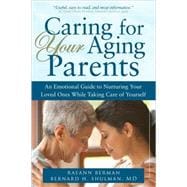
What is included with this book?
| Acknowledgments | p. vii |
| Prologue | p. ix |
| Living on the Far Side | p. 1 |
| Missed Signals | p. 13 |
| Sending Straight Signals | p. 33 |
| It's All in the Family | p. 49 |
| Who's the Boss? | p. 67 |
| Breaking Out of Old, Destructive Patterns | p. 89 |
| How to Help Our Parents Compensate Constructively | p. 117 |
| Taking Care of Yourself as well as Your Parent | p. 131 |
| When Your Parent Has to Move: How to Find the Best Living Arrangements | p. 157 |
| How to Talk about Difficult Subjects | p. 175 |
| Dealing with Confusion and Memory Loss | p. 197 |
| What Does the Future Hold for America's Seniors? | p. 213 |
| Resources | p. 217 |
| Bibliography | p. 227 |
| Index | p. 231 |
| About the Authors | p. 243 |
| Table of Contents provided by Ingram. All Rights Reserved. |
The New copy of this book will include any supplemental materials advertised. Please check the title of the book to determine if it should include any access cards, study guides, lab manuals, CDs, etc.
The Used, Rental and eBook copies of this book are not guaranteed to include any supplemental materials. Typically, only the book itself is included. This is true even if the title states it includes any access cards, study guides, lab manuals, CDs, etc.